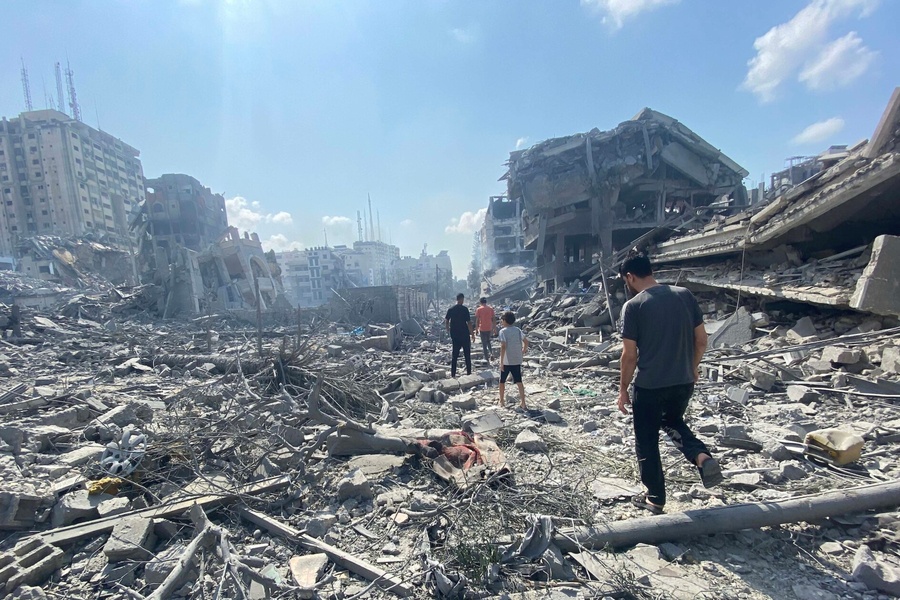A Survey of Recent Developments and Trends in Universal Jurisdiction
The legal principle of universal jurisdiction is increasingly being used to bring accountability for atrocity crimes across the world. An overview of recent developments sheds light on certain patterns that may have begun to emerge.

Published by The Lawfare Institute
in Cooperation With

On Jan. 13, 2021, the Higher Regional Court in Koblenz, Germany, convicted senior Bashar al-Assad government official Anwar Raslan for a crime against humanity—in the form of killing, torture, serious unlawful detention, rape and sexual assault—and sentenced him to life in prison. Raslan was the former head of the Syrian General Intelligence Directorate’s investigation department—specifically overseeing the investigations section of Branch 251 and later Branch 285, detention centers where officials held and interrogated suspected anti-government activists. The court found it had been proved that Raslan was “a co-offender in a protracted and systematic attack that was launched against the civilian population of Syria, resulting in 27 people being murdered and 4,000 others having their physical freedom impaired in a serious manner, they also having been subjected to torture during their times in prison.”
As I discussed on Lawfare in 2019—when German investigative police first arrested Raslan alongside his later co-defendant, Eyad al-Gharib—German legislation incorporates the Rome Statute of the International Criminal Court (ICC) into domestic law. (Notably, al-Gharib received a similar fate to Raslan in February 2021, when he was convicted of aiding and abetting 30 cases of crimes against humanity.) Section 1 of Germany’s 2002 Code of Crimes Against International Law provides German courts with “pure” universal jurisdiction over the crimes listed in the code—even in the absence of a link between Germany and the crime. While different legislative wording leads to different levels of “purity” of the universal jurisdiction principle, states that specifically incorporate principles of universal jurisdiction into their domestic legislation include Argentina, Austria, Finland, France, Germany, Norway and Sweden, among others. (For more information on the difference between “pure” and “conditional” universal jurisdiction, see the International Center for Transitional Justice report on universal jurisdiction, here.)
An imaginably obvious observation about these states is a geographic one: Apart from Argentina, all are in Europe. But now, the kicker: The states where crimes are being investigated under the principle of universal jurisdiction also tend to be in the “Global South.” The criticism that international criminal law is used by hypocritical Western nations to unequally enforce certain norms through “jurisdictional imperialism” is not new to the international criminal law project, the workings of the ICC or even to the universal jurisdiction paradigm itself. Such a critique is frequently associated with third world approaches to international law. What is new, however, is the growing corpus of ICC and universal jurisdiction case law—the latter of which arises from both individual organizational complaints and dedicated war crimes units. This growing corpus warrants higher-level analysis of the way these cases are functioning: the degree to which case selection is—or is not—politicized; interactions between public and private entities and associated issues of evidence sharing; the effects of extraterritorial investigation and prosecution on principles of ICC complementarity; and perhaps even ultimate issues of forum selection or “shopping.”
Given this background, here is a nonexhaustive survey of recent developments in cases conducted under the principle of universal jurisdiction. (For comprehensive resources on the topic, see Trial International’s Universal Jurisdiction Database and its Universal Jurisdiction Annual Review.)
Syria
The use of universal jurisdiction for crimes committed in Syria focuses primarily on the Syrian government’s alleged crimes against civilians, especially those committed since March 2011 in the wake of the Arab Spring. Since its first report in 2011, the Independent International Commission of Inquiry on the Syrian Arab Republic has been concerned that the gross violations of human rights committed by the Syrian military and security forces amount to crimes against humanity. For the past several years, the commission has been certain that the Assad government committed both crimes against humanity and war crimes.
Apart from the two aforementioned cases, recent progress under the universal jurisdiction principle includes:
- On Jan. 4, Swedish public prosecutors charged a 49-year-old Swedish woman with a war crime and a serious violation of international law for having allegedly made it possible for her 12-year-old son to be recruited and used as a child soldier in Syria from the ages of 12 until 15. The main hearings in the case began on Jan. 12 in the Stockholm District Court.
- On Nov. 24, 2021, the French Court of Cassation ruled itself incompetent to hear proceedings against Syrian state security services official Abdulhamid C., on the grounds that Syria has neither ratified the Rome Statute nor criminalized crimes against humanity in domestic legislation (dual criminality).
- On Nov. 10, 2021, the Higher Regional Court of Frankfurt/Main approved the July 2021 indictment of a 36-year-old Syrian man, Alaa Mousa. Mousa was an assistant doctor who worked in the Military Hospital No. 608 in Homs, Syria, between April 2011 and the end of 2012, as well as in Military Hospital No. 601 in the Mezzeh district of Damascus. In these hospitals, as well as in Branch 261, Mousa allegedly tortured people in 18 cases and killed one. The main hearings in the case began on Jan. 19.
For other, less recent developments regarding accountability for the Syrian regime, including in Austria and Sweden, see this 2019 Lawfare post by Emma Broches.
Iran
The recent use of universal jurisdiction for crimes committed in Iran centers on the 1988 alleged forcible disappearances and killings of political prisoners affiliated with political opposition groups, which U.N. human rights experts have stated may amount to crimes against humanity. During the final phase of the Iran-Iraq War, an armed branch of the Iranian People’s Mujahedin attacked Iran on a number of occasions, after which time the Supreme Leader of Iran ordered the execution of all prisoners held in Iranian prisons who were sympathetic to the Mujahedin. The alleged mass killing of prisoners then took place in 16 cities across Iran.
- On July 27, 2021, Swedish prosecutors indicted Iranian citizen Hamid Noury on suspicion of war crimes for his role in the 1988 prison massacre at Gohardasht Prison in Karaj, Iran, where he purportedly held the position of assistant to the deputy prosecutor. The indictment classified the acts in which Noury allegedly took part as war crimes due to their nexus to the armed conflict. Noury is also charged with murder due to his allegedly intentionally killing a large number of prisoners in a manner considered unrelated to the armed conflict. The trial is expected to continue until April 2022.
Iraq
Universal jurisdiction for crimes committed in Iraq has been used to prosecute Islamic State members for their alleged abuses against the Yazidis. Based on its independent criminal investigations, the U.N. Investigative Team to Promote Accountability for Crimes Committed by Da’esh/Islamic State in Iraq and the Levant “has established clear and convincing evidence that genocide was committed by ISIL against the Yazidi as a religious group.”
- On Nov. 30, 2021, the Higher Regional Court of Frankfurt/Main found 29-year-old Islamic State member Taha Al-J guilty of genocide alongside a crime against humanity resulting in death, a war crime against persons resulting in death, aiding and abetting a war crime against persons in two cases, and bodily harm leading to death. This was notably the first conviction for genocide against the Yazidis.
Liberia
The use of universal jurisdiction for crimes committed in Liberia tends to focus on alleged abuses that occurred during one of two time frames: the First Liberian Civil War, which took place from 1989 to 1996, and the Second Liberian Civil War, which took place from 1999 to 2003.
- The trial against former leader of the Sierra Leonean Revolutionary United Front Gibril Massaquoi, charged with committing war crimes and crimes against humanity in Liberia between 2001 and 2002, is coming to a close. Portions of the trial were heard in Finland and others in Sierra Leone and Liberia—in the first war crimes trial to be held on Liberian soil.
- On June 18, 2021, the Swiss Federal Criminal Court found Liberian Alieu Kosiah guilty of war crimes and sentenced him to 20 years in prison. He was also ordered to pay compensation to seven complainants. His was the first universal jurisdiction trial to be held in Switzerland.
The Gambia
The use of universal jurisdiction for crimes in The Gambia centers on alleged violations committed under the regime of former President Yahya Jammeh. A 2017 act passed by the Gambian National Assembly created a Truth, Reconciliation and Reparations Commission to investigate and establish an impartial record of the violations under the regime, as well as to consider reparations, promote reconciliation and promote nonrecurrence.
- In October 2021, the Swiss Federal Criminal Court rejected former Gambian Interior Minister Ousman Sonko’s appeal against another extension of his pretrial detention. As of Jan. 26, Sonko has been in preventive pretrial detention in Switzerland for five years, suspected of crimes against humanity.
Rwanda
The use of universal jurisdiction for crimes committed in Rwanda focuses on alleged offenses, including crimes against humanity and war crimes, perpetrated primarily against civilians of the Tutsi minority ethnic group and moderate Hutus in the context of the 1994 genocide. From its opening in 1995 to its closure in 2015, the International Criminal Tribunal for Rwanda (ICTR) delivered verdicts against individuals responsible for such crimes. Since 2012, the International Residual Mechanism for Criminal Tribunals has assumed responsibility for several of the ICTR’s functions.
- From May 9 to July 1, former prefect Laurent Bucyibaruta will appear before the Paris Assize Court. Bucyibaruta was charged in 2018 with genocide and crimes against humanity.
- On Dec. 16, 2021, the Paris Assize Court sentenced a French-Rwandan man, Claude Muhayimana, to 14 years in prison for complicity in genocide and complicity in crimes against humanity. Muhayimana’s lawyers have indicated that they will appeal.
- On Sept. 20, 2021, the Paris Court of Justice ordered a trial against former Rwandan gendarme Philippe Hategekimana for genocide, crimes against humanity and participation in a group formed to fulfill such crimes.
Suriname
Universal jurisdiction has been used for alleged crimes committed in Suriname during the Interior War, the civil war in Suriname that took place between 1986 and 1992.
- On Oct. 26, 2021, Dutch police arrested a 55-year-old man suspected of committing war crimes during the Interior War.
Myanmar
The use of universal jurisdiction for crimes committed in Myanmar focuses primarily on alleged abuses and human rights violations by military and security forces—especially against the Rohingya community—since 2011. After the mandate of the Independent International Fact-Finding Mission on Myanmar ended in September 2019, the Independent Investigative Mechanism for Myanmar took its place, collecting evidence of the “most serious international crimes and violations of international law committed in Myanmar since 2011.” Since the Tatmadaw armed forces seized power in February 2021, the Mechanism has also collected evidence with a view toward analyzing whether crimes against humanity were committed.
- On Nov. 26, 2021, the Federal Criminal Court in Buenos Aires decided that the Buenos Aires federal jurisdiction must investigate the alleged commission of crimes against humanity between 2012 and 2017 in Myanmar against the civilian population of the Rohingya community. This decision came after the lower court dismissed the case on July 12, 2021, due to the ongoing investigation before the ICC.
***
What can be gleaned, if anything, from this survey of recent developments in universal jurisdiction cases? While all merit further examination, three patterns are worth mentioning here. The first is that the domestic systems where these cases are occurring tend to be civil law systems and those that employ the inquisitorial method of adjudication. While correlation does not imply causation, and there are many other factors at play, perhaps the inquisitorial system better lends itself to adjudication of crimes under international law than does the adversarial system. Or, maybe still, states with civil legal systems, and monist approaches to international law, tend to be more deferential to the international criminal law project writ large.
Second, while in many instances universal jurisdiction cases are brought by organizations, in others they are brought by specialized war crimes units, such as the French Central Office for Combatting Crimes Against Humanity, Genocide, and War Crimes, the German Central Office for Combatting War Crimes and the Dutch International Crimes Team. Although international legal obligations to investigate and prosecute certain crimes are placed on states, and not on individuals or private organizations, the interoperability between public and private entities, as well as the degree to which such units are subject to political capture, are worth exploring.
Finally, it is interesting to examine the use of international criminal justice as a vehicle for something akin to reparations, or even as an implication that former colonies cannot be trusted to govern their own affairs. Interestingly, several states in which cases are taking place, or have taken place, are states tied by colonial history to the states where investigated crimes allegedly occurred. The recent Dutch arrest of a man suspected of war crimes in Suriname, attempted French proceedings against a Syrian state security official, and the fact that Belgium is the European country with the most judgments concerning the Rwandan genocide are all examples of this. While practicable for linguistic reasons—which notably are also products of colonial history—this observation may intimate something about the use of international criminal law as a tool of foreign policy.





